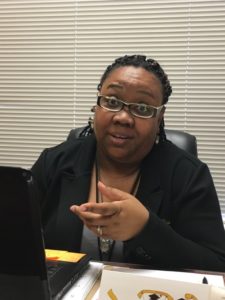This is the latest post in our ongoing series on the center-left roots of school choice.
Four years ago, Angela Kennedy, a teacher in Orlando, Fla., actualized an idea once prominently advanced by school choice supporters on the left. After 14 years of mounting frustration with public schools, she started her own private school.

Today, thanks to more than 70 school choice scholarships, Kennedy’s faith-based Deeper Root Academy is a high-quality haven for low-income and predominantly black students. It’s also another concrete example of what’s possible, for teachers and principals, when school choice expands.
What better time than now to remind people.
This spring, progressives across America cheered teachers striking for more money, and it’s a safe bet the striking and cheering will resume this fall. But for decades, other progressives have urged teachers to embrace school choice so they can have more power.
In 1970, the War on Poverty liberals who led a school voucher experiment for the U.S. Office of Economic Opportunity stressed that choice would allow teachers to create their own schools, free from soul-sucking bureaucracies. “Given freedom and financial resources,” they wrote, “educators might create large numbers of schools that are significantly different from those now operated by local boards of education.”
In 1973, pioneering choice advocate (and former UMass ed school dean) Mario Fantini posited that expanding options would liberate “the imprisoned teacher.” “Obviously, we need to open up educational alternatives within the framework of public education, not by chance but by choice,” he wrote in “Public Schools of Choice” (his emphasis, not mine). “Teachers (and there are a significant number who feel imprisoned by the structure itself) ought to be encouraged to develop alternative forms that are congruent with their own styles of teaching and can offer them greater professional satisfaction and to increase significantly the chances for educational productivity.”
In 1978, Berkeley law professors Jack Coons and Stephen Sugarman opened “Education by Choice” with a story about a fictional student and a fictional teacher. The student is keen on art and bored at her school. But there isn’t an easily accessible option within the district, and her parents can’t afford private school. Meanwhile, the teacher has developed an arts-based curriculum, but can’t persuade the district to give it a shot. Starting his own school is out of the question because “he prefers not to run an elitist school” and no state-supported scholarships exist to promote equity and diversity.
The Berkeleyites’ solution: Give teachers power to create schools. Give parents power to choose them, or not.
In choice-rich states like Florida, growing numbers of teachers are using that power.
Angela Kennedy grew sick of state mandates while kids of color kept crashing. She considered becoming an administrator, but ultimately decided it wouldn’t be enough. Not when Florida, with a suite of school choice scholarships, offered the funding and flexibility for ambitious educators to go further.
“It was that back and forth, thinking about where I could be the most impactful,” Kennedy said in an interview last year. “Would it be to stay and try to start a change? To try to deal with a mammoth system. Not likely that I’m going to get very far … “
“But what I could do is give people an option. And that’s where this school came from. I wanted parents and students and teachers to have another option.”
To be sure, school choice supporters on the left aren’t the only ones who’ve made (and are still making) this argument.
In “Market Education: The Unknown History,” the late, great Andrew Coulson highlighed societies, from ancient Greece to modern Japan, where innovative teachers planted 1,000 flowers.
In patriarchal Athens, the feminist Aspasia set up a school that many wealthy Athenians appreciated for their daughters. “Crusty conservatives” condemned it, Coulson writes, but too bad for them. “One great virtue of this system was that as long as there were enough people interested in what a teacher had to say, it did not matter if the rest of the public was actively hostile to his work, he could still carry on.”
Just imagine Aspasia’s reach had “vouchers” enabled everyday Athenians to access her school, too.
Over time, the teacher empowerment case for choice has become less pronounced. It still surfaces here and there, but it’s not as central. I don’t know why that happened. But in states like Florida, I predict a comeback.
Tens of thousands of Florida teachers now work in charter and private schools. And like Florida parents, they’ve become more active in defending their options. Private school educators (see here, here and here) went to bat against the teacher union lawsuit that aimed to kill the Florida Tax Credit Scholarship. Charter school teachers are doing likewise (see here, here and here) with attacks on their schools.
They know the pros and cons of each sector. Yet it’s not hard to find Florida teachers (like this one, this one, and this one) who migrated from district schools. Or others (like these two and these two) who went a step further, a la Angela Kennedy.
Some argue that teachers from West Virginia to Arizona went on strike this year because they were out of options. But in Florida, teachers have more and more options.
And not just to change how much they’re paid.


